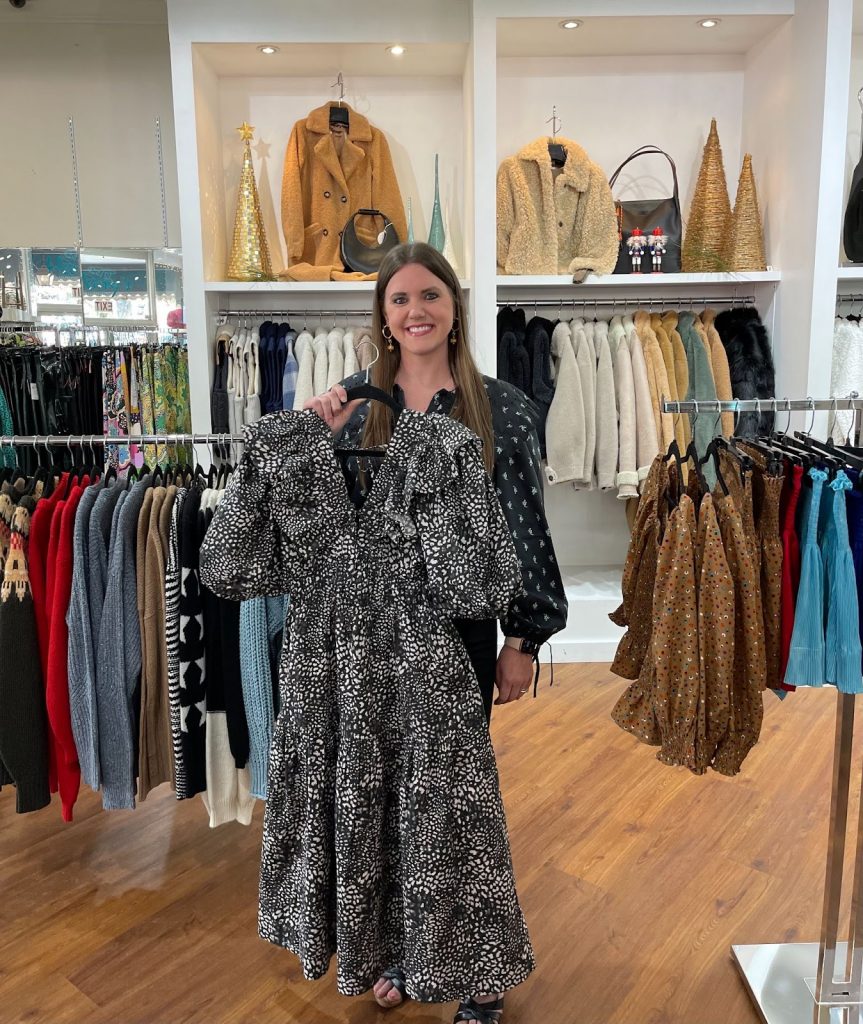
Dynamite Clothing owner Loretta Paluck knows firsthand what it was like to operate a clothing business amidst a global pandemic. The hardest part was the feeling of the unknown. Dynamite closed its doors for around three months and shifted to online sales as a way of staying afloat. With case numbers decreasing, Dynamite is back to almost normal working conditions with the exception of having customers wear masks in the store and having a certain amount of customers inside during a period of time.
Retail is one of the prime aspects of the fashion industry that has been affected by the COVID-19 pandemic, especially in Athens. The global supply chain was put to a halt, and factories were forced to shut down. The rise of fast fashion created overconsumption problems. So, what do we do now? Self-expression through accessories, repurposing vintage clothing, and using social media to connect with customers are just a few ways that the fashion industry has adapted.
Stephanie Dean, manager of Heery’s Clothes Closet, said that she has noticed that clothing companies are not producing as much inventory as they have in previous years.
I think it’s because I think that most people aren’t producing as much as they did, the work of it, just because they’re, they’re afraid that, you know, they overproduce and they’re not going to sell it, and then we’ll be stuck with it,” said Dean.
Dean said that it roughly takes the store around six months to prepare for the next season, especially right now with the holiday season approaching.
Community, a boutique for sustainable fashion and locally made products from around Georgia, had to adapt to the changing landscape of fashion trends and what customers were wanting to purchase and wear. With people working from home, clothing shifted from professional work attire to comfier styles.
“So I remember we were selling a lot of comfortable dresses. People and customers commented on spending more time in their gardens and just around their homes. And so wanting really comfortable pieces. Actually funny enough, earring sales have done better than other jewelry items, just because that’s something that when you’re on a zoom call, you can dress up your look with the earrings,” said manager Meredith Drury.
With more people working from home, the time of isolation allowed for people to play around with their self-expression through trying different types of clothing they would normally not wear.
Clair McClure, a lecturer and undergraduate coordinator in UGA’s Textiles, Merchandising, and Interiors Department, said that isolation from others allowed people to experiment with different types of clothing as a way of self-expression.
“I do think that there would be something to be said for people missing that opportunity to show their self-expression, when they’ve just been like a face on the screen or even a black screen, you know, in the little Zoom box, and the opportunity to begin to build their self-expression again, as they get back into normal life,” said McClure.
As people began to build their self-expression through new clothing trends came the rise of fast fashion and overconsumption. Fast fashion is when companies will take popular trends and mass-produce them often in ways that are not sustainable.
Laura McAndrews, an assistant professor in UGA’s Department of Textiles, Merchandising, and Interiors, said the demand for clothing, especially fast fashion, as the world is slowly going back to normal, is too overwhelming, and the supply chain is trying to keep up with the high demand.
“A lot of our things are made globally, specifically in Asia, and that’s where COVID kind of hit first,” McAndrews said. “And so there were a lot of factory closings, and there just wasn’t anything in that supply chain. Now that the supply chain is going along, it’s just clogged because of the overconsumption.”
The pandemic allowed businesses to work on their use of social media and online commerce. Many retailers took the time in lockdown to build up their social media presence and utilize different social media platforms to fulfill orders and promote products.
Meredith Drury, manager of Community, shared her experience of what it was like for the store during the initial stages of the pandemic.
We had to start utilizing social media and posting more often. We basically shifted to more to online sales and actually selling vintage via Instagram too,” said Drury.
Paluck had a similar experience as the owner of Dynamite Clothing, a vintage clothing shop in downtown Athens, for over 20 years. Like other businesses, she said that Dynamite had to shift to more online commerce and utilize social media.
“As soon as we closed our doors, we started relying heavily on Instagram to help keep our shop going,” she said. “We were shipping all over the US and also offered curbside pickup.”
Paluck said that Athens is a great place for vintage clothing sellers since it is a college town filled with students who are more open to funkier styles while still being conscious about sustainability.
“Considering vintage is sustainable, and many people are concerned with where they buy their clothing, we have seen more people leaning toward vintage instead of new,” said Paluck. Plus, it’s more fun to find that one-of-a-kind piece that no one else will have and will make you stand out.”
With regard to social media, McClure said that Athens is a really good example of how the increase in social media use and influencer culture was increased throughout the pandemic. Local stores will partner with college social media influencers as a way of advertising their store’s products due to their large amount of followers.
“But when you find maybe someone in a local community, like Athens, an influencer in Athens, that’s got 10,000 or 20,000 followers,” said McClure. “That’s a good core group that’s really following them. And so brands will be real savvy about who they partner with and who their influencers are.”
On a brighter note, there was a sense of normalcy among all of these retailers. It seems that the approaching normal includes the trend of less-consumptive clothing styles. As the world slowly shifts back to what it was like pre-pandemic, people are want to still show self-expression along with choosing more sustainable clothing styles. People are pushing out of the athleisure box into more expressive styles.
“Everybody wants a little bit of everything,” said Dean.
Colt Yeargin is majoring in journalism at the University of Georgia.








Show Comments (1)
Shira Wilson
Wonderful post! Keep up the good writing. Thanks for sharing with us!